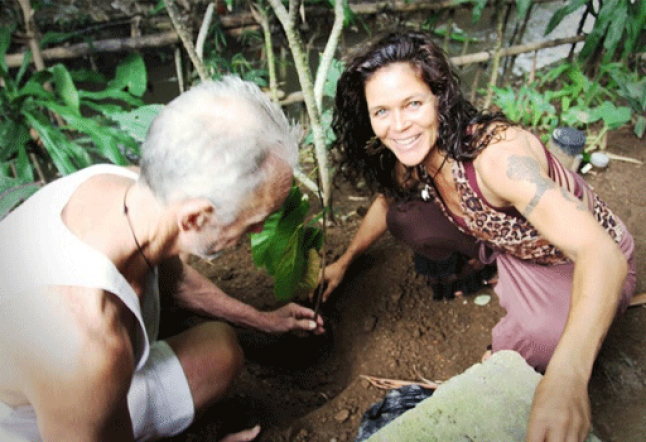interview with malaika danville – planting change in bali

Have you had pizza, sushi, Gorgonzola, or goji berries in the past week? Here in Bali, we are lucky to have access to international culinary experiences.
However, much of what we are consuming is increasingly imported. Our global palette strains the environment – a reality that many consumers easily overlook.
Eating “locally” is now fashionable in the West, but here in Bali, some are concerned that there is not enough emphasis on celebrating local food production and cuisine.
Malaika Darville is a passionate seed collector, planter, and seed saver and is currently in Bali sharing her passion. YOGI TIMES sat down with her to find out more.
Mirjam De Ruiter for YT: What makes you so excited about seeds?
Malaika Danville: When my siblings told stories during my childhood, my brother would say, “back then, you weren’t even a seed,” so maybe that is what planted the seed!
MDR: When did you start traveling and planting seeds?
Malaika Danville: In 2010, I decided to leave my home and share my knowledge of seeds. I have planted seeds all over the world. Even though I don’t usually eat the produce, I know somebody will.
The trick that my teachers, Michelle and Jude, taught me most is trying to discover what is native to each place.
Each seed has a song, a dance, and is attached to something to do with their ancestors in every culture.
MDR: What is native to Bali?
Malaika Danville: Bali used to cultivate different types of rice for various purposes.
For example, special rice was used for breastfeeding and another for specific ceremonies to honor the gods.
Growing rice is labor-intensive, and with cultural traditions being influenced by global economies and global educational indoctrination, you do not see the next generation planting rice alongside their grandparents.
Instead, they are looking for “real” jobs in Circle K, restaurants, or the tourist industry.
They are not so interested in getting dirty in the rice fields. Today most of the workers in the rice fields are actually from Java.
One idea for a Balinese farmer now might be to use their rice field to grow a variety of foods, rather than just rice.
MDR: What have you learned in Bali about ceremonies and planting?
Malaika Danville: This island is full of beautiful traditions. From the holy Banyan trees to the rituals of grandfathers planting jackfruit or mangosteen trees for every grandchild to celebrate new life.
You can point out the trees that are now twenty-five years old; that’s Eka’s tree, Brandon’s tree, and Jaden’s tree.
The kids and the trees are connected, and they will provide food for the next generation.
MDR: What do you see as the biggest threat to the environment?
Malaika Danville: A culture that is based on greed and capitalist gain at all costs is costing us the Earth.
Multinational Corporations are trying to eliminate biodiversity because the more diverse something is, the harder it is to control.
But biodiversity is what we want because when we all buy packets of hybridized seeds, all the food will taste the same.
These foods need the same chemicals, fertilizers, and pesticides, all of which are poisonous.
The dangers of monocropping are countless. Entire species will disappear, along with cultural and nutritional values.
MDR: What do you suggest people do here?
Malaika Danville: Resist eating imported fruits such as apples, kiwis, and grapes.
Instead, visit the local markets in the morning and buy what the farmers are selling; rambutan, durian, papaya, avocado, or salak.
Bali is becoming a yoga capital, but so many people only focus on the asanas, but part of yoga is also Seva (giving back) to the community.
It’s great to have a perfect yoga outfit, but what do you do for your community?
My motto is “plant something that grows.”
As well as being a lovely gesture, planting or giving a tree makes an excellent gift for birthdays or the arrival of new babies.
Here’s what we can do:
1. Plant food whenever and wherever you can. Stick the top of a pineapple in the ground or a pot.
Plant that papaya pit and come back in six months to see the results.
2. Buy fruit trees or give seeds as gifts for every occasion, for everyone, all the time. Seeds and trees are a great and grateful present!
3. Support: Plant It Forward, a non-profit grassroots initiative inmyelements.com
4. Watch the documentary OUR SEEDS, seedsavers.net
For more info on Bali’s best spots for the modern yogi
| STAY | SPA | PLAY | EAT | SHOP | YOGA |
Download our ULTIMATE BALI GUIDE for free
